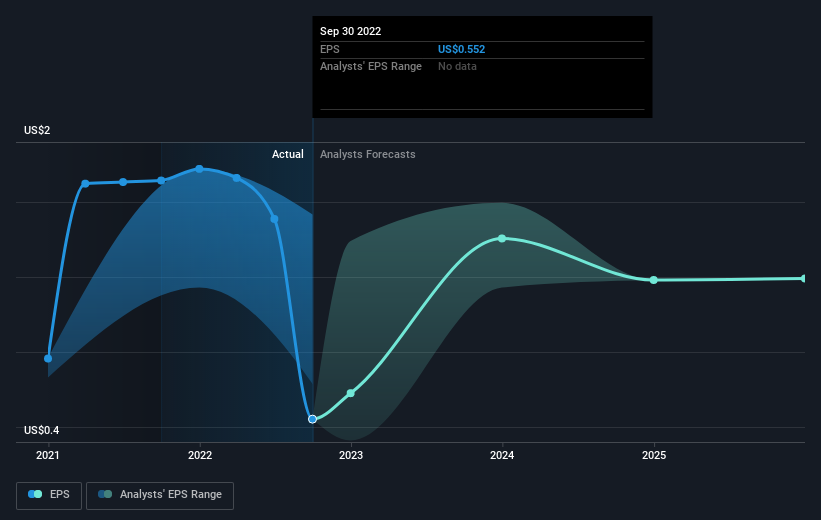- United States
- /
- Mortgage REITs
- /
- NYSE:KREF
KKR Real Estate Finance Trust's (NYSE:KREF) one-year decline in earnings translates into losses for shareholders

The simplest way to benefit from a rising market is to buy an index fund. While individual stocks can be big winners, plenty more fail to generate satisfactory returns. For example, the KKR Real Estate Finance Trust Inc. (NYSE:KREF) share price is down 31% in the last year. That's disappointing when you consider the market declined 16%. Looking at the longer term, the stock is down 27% over three years. The falls have accelerated recently, with the share price down 10% in the last three months.
Although the past week has been more reassuring for shareholders, they're still in the red over the last year, so let's see if the underlying business has been responsible for the decline.
See our latest analysis for KKR Real Estate Finance Trust
In his essay The Superinvestors of Graham-and-Doddsville Warren Buffett described how share prices do not always rationally reflect the value of a business. By comparing earnings per share (EPS) and share price changes over time, we can get a feel for how investor attitudes to a company have morphed over time.
Unhappily, KKR Real Estate Finance Trust had to report a 74% decline in EPS over the last year. This fall in the EPS is significantly worse than the 31% the share price fall. It may have been that the weak EPS was not as bad as some had feared.
The company's earnings per share (over time) is depicted in the image below (click to see the exact numbers).

It's probably worth noting that the CEO is paid less than the median at similar sized companies. It's always worth keeping an eye on CEO pay, but a more important question is whether the company will grow earnings throughout the years. This free interactive report on KKR Real Estate Finance Trust's earnings, revenue and cash flow is a great place to start, if you want to investigate the stock further.
What About Dividends?
It is important to consider the total shareholder return, as well as the share price return, for any given stock. The TSR is a return calculation that accounts for the value of cash dividends (assuming that any dividend received was reinvested) and the calculated value of any discounted capital raisings and spin-offs. It's fair to say that the TSR gives a more complete picture for stocks that pay a dividend. We note that for KKR Real Estate Finance Trust the TSR over the last 1 year was -24%, which is better than the share price return mentioned above. This is largely a result of its dividend payments!
A Different Perspective
While the broader market lost about 16% in the twelve months, KKR Real Estate Finance Trust shareholders did even worse, losing 24% (even including dividends). However, it could simply be that the share price has been impacted by broader market jitters. It might be worth keeping an eye on the fundamentals, in case there's a good opportunity. On the bright side, long term shareholders have made money, with a gain of 4% per year over half a decade. It could be that the recent sell-off is an opportunity, so it may be worth checking the fundamental data for signs of a long term growth trend. It's always interesting to track share price performance over the longer term. But to understand KKR Real Estate Finance Trust better, we need to consider many other factors. To that end, you should learn about the 4 warning signs we've spotted with KKR Real Estate Finance Trust (including 1 which doesn't sit too well with us) .
We will like KKR Real Estate Finance Trust better if we see some big insider buys. While we wait, check out this free list of growing companies with considerable, recent, insider buying.
Please note, the market returns quoted in this article reflect the market weighted average returns of stocks that currently trade on US exchanges.
Valuation is complex, but we're here to simplify it.
Discover if KKR Real Estate Finance Trust might be undervalued or overvalued with our detailed analysis, featuring fair value estimates, potential risks, dividends, insider trades, and its financial condition.
Access Free AnalysisHave feedback on this article? Concerned about the content? Get in touch with us directly. Alternatively, email editorial-team (at) simplywallst.com.
This article by Simply Wall St is general in nature. We provide commentary based on historical data and analyst forecasts only using an unbiased methodology and our articles are not intended to be financial advice. It does not constitute a recommendation to buy or sell any stock, and does not take account of your objectives, or your financial situation. We aim to bring you long-term focused analysis driven by fundamental data. Note that our analysis may not factor in the latest price-sensitive company announcements or qualitative material. Simply Wall St has no position in any stocks mentioned.
About NYSE:KREF
KKR Real Estate Finance Trust
A mortgage real estate investment trust, focuses primarily on originating and acquiring transitional senior loans secured by commercial real estate (CRE) assets in the United States.
Reasonable growth potential second-rate dividend payer.
Similar Companies
Market Insights
Community Narratives




